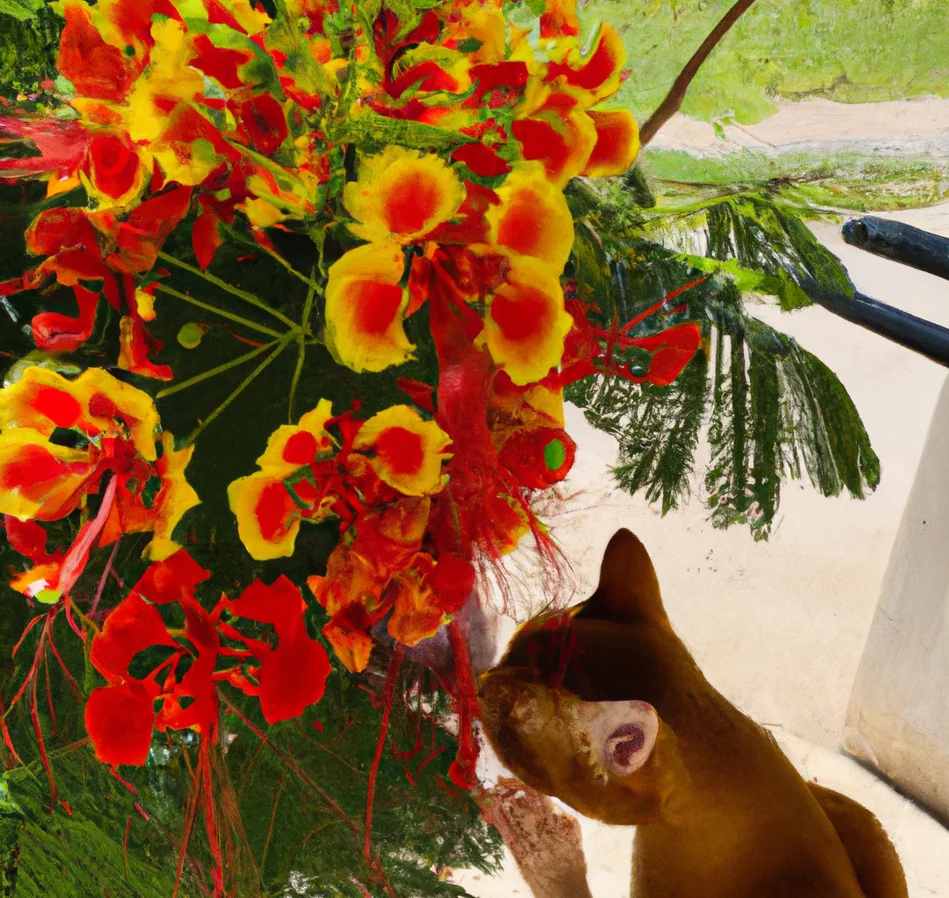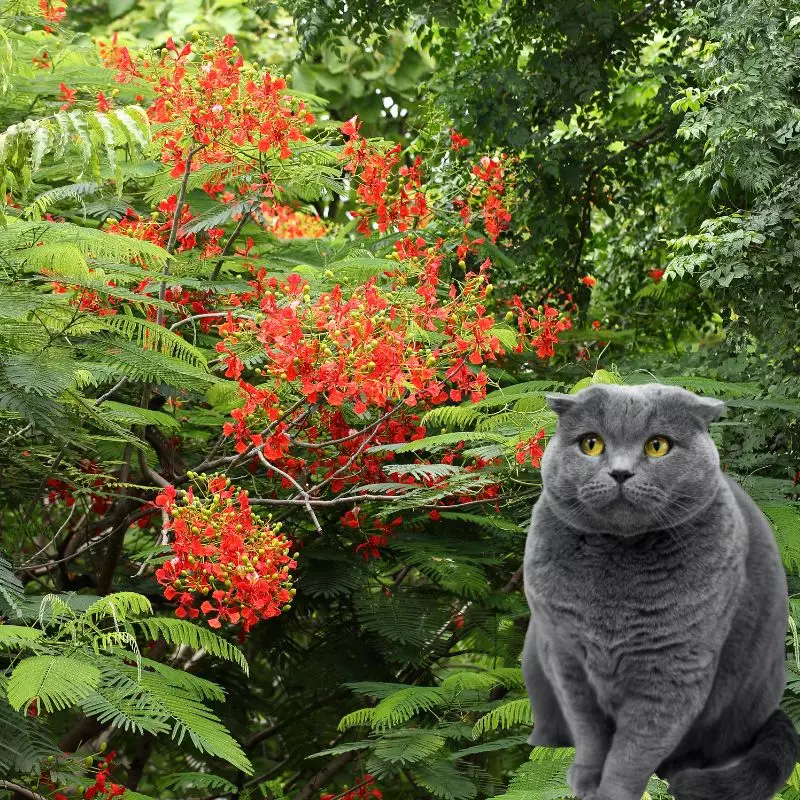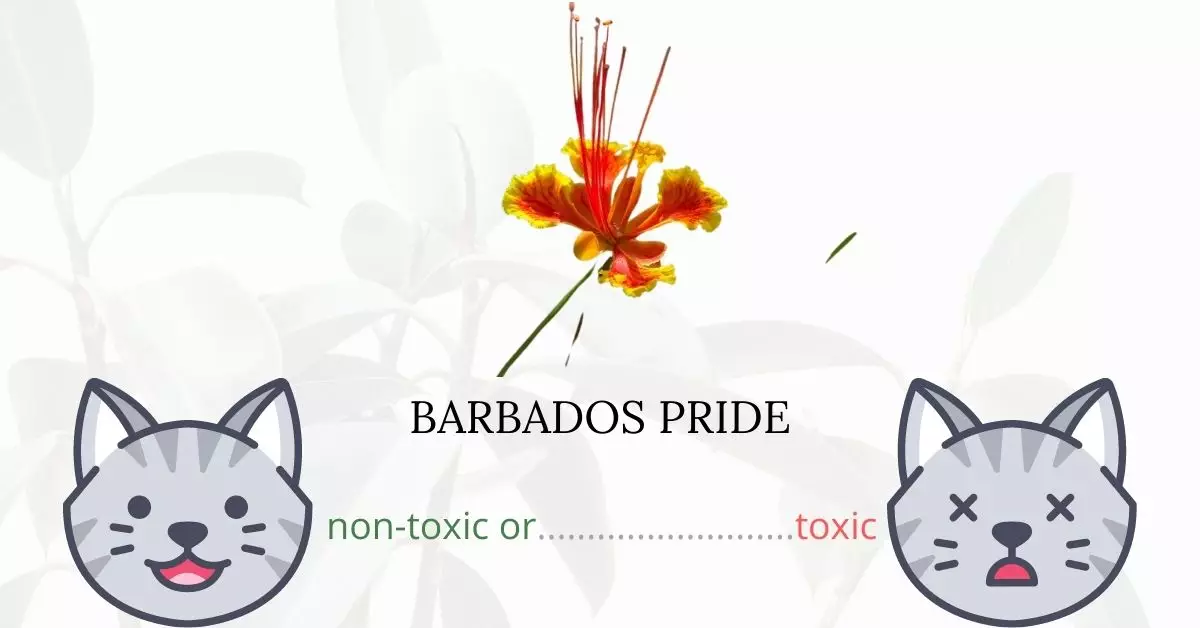The Barbados Pride, alternatively recognized by its various common names such as Peacock Flower, Dwarf Poinciana, Barbados Flower Fence, and Red Bird of Paradise, stands as a significant symbol, being the national flower of Barbados. While its vibrant blossoms enhance the aesthetic appeal of gardens, and it holds a place in medicinal applications, it is crucial to note that it is indeed toxic to cats, among other animals.
This article, formulated in association with a team of seasoned Doctors of Veterinary Medicine (DVMs), aims to delineate the precise risks associated with this flowering shrub and its impact on feline companions, ensuring the dissemination of reliable and current information. Our team of experts has undertaken extensive research on authoritative sites such as ASPCA and PetMD, to validate every piece of information provided herein, focusing particularly on the Barbados Pride in this context.
Barbados Pride’s seeds harbor tannins, which can induce symptoms of gastrointestinal disorder in cats, while its leaves are imbued with hydrogen cyanide, potentially causing breathing difficulties in cats. Typically, cats that have ingested parts of the Barbados Pride plant exhibit symptoms including vomiting, diarrhea, and lethargy. Through collaborative efforts and rigorous research, we strive to present accurate knowledge on the potential hazards posed by various plant species, such as the Barbados Pride, and their consequential effects on cats, empowering pet owners to make informed and safe decisions for their furry friends.
Clinical Signs of Barbados Pride Poisoning in Cats

Exposure or ingestion of the Barbados Pride plant induces a range of clinical signs in cats, primarily manifesting as gastrointestinal disturbances due to the presence of harmful substances like tannins and hydrogen cyanide in the plant’s seeds and leaves. The severity of the symptoms can range from mild to moderate, but if a cat has consumed a substantial quantity of the plant, it may experience more severe, life-threatening conditions. Immediate veterinary intervention is crucial if your cat displays any of the following clinical signs after coming into contact with, smelling, or ingesting Barbados Pride:
- Vomiting: A common symptom, induced by the irritation and inflammation of the gastrointestinal tract due to the ingestion of tannins found in the seeds. It’s the body’s natural response to expel the toxic substance.
- Diarrhea: The tannins in the seeds also disrupt the normal function of the digestive system, leading to frequent, loose stools as the body tries to eliminate the toxins.
- Mouth Irritation: The presence of toxic elements in the plant causes irritation and inflammation in the mouth, visible as redness, swelling, or ulcers, especially if the cat has chewed on the leaves or seeds.
- Excessive Drooling: This is often a response to mouth irritation or the body’s attempt to flush out the toxins and can be particularly noticeable if the cat has ingested or just smelled the plant.
- Lethargy: The overall weakness and lack of energy are due to the body’s systemic response to the toxins, which impacts the cat’s metabolic processes and energy levels.
- Coordination Issues: The ingestion of hydrogen cyanide, found in the leaves, can impact the nervous system, leading to a lack of coordination and balance as the body struggles to cope with the toxic onslaught.
Remember, it is imperative to seek immediate veterinary attention if any of these symptoms are observed, as early intervention can significantly improve the prognosis and ensure the well-being of your feline companion. The severity of symptoms can escalate quickly, making prompt action crucial to prevent any long-term health implications or fatal outcomes.
First Aid and Treatment of Barbados Pride Poisoning in Cats

Flushing out the toxins from your cat’s system is a priority in treating poisoning. The veterinarian will provide immediate supportive care to your cat, which may include intravenous hydration, oxygen therapy to treat respiratory symptoms, and necessary cardiac medication or medicine to treat other organ system dysfunctions. Administering activated charcoal may also be recommended by the vet depending on the severity of your cat’s condition. The vet may also perform gastric lavage to eliminate any remaining toxic substances from your cat’s stomach.
Recovery from Barbados Pride Poisoning in Cats

Your cat will fully recover quickly as long he or she was given proper care and treatment immediately. Rest, plus possibly a particular diet and medication, will be required for your cat to recover from any organ system damage. It is advisable to follow up with your veterinarian to ensure that your cat recovers completely.
Prevention of Barbados Pride Poisoning in Cats
Since Barbados Pride is usually found in floral arrangements, ensure that any floral arrangements containing this or other hazardous plants are out of your cat’s reach. Remove Barbados Pride and any other hazardous plants from your house or garden to keep them out of reach of your cat. As much as possible, keep your cat safe indoors to prevent exposure to toxic plants in your neighborhood.
If you love plants but have cats at home, check out these lists:





